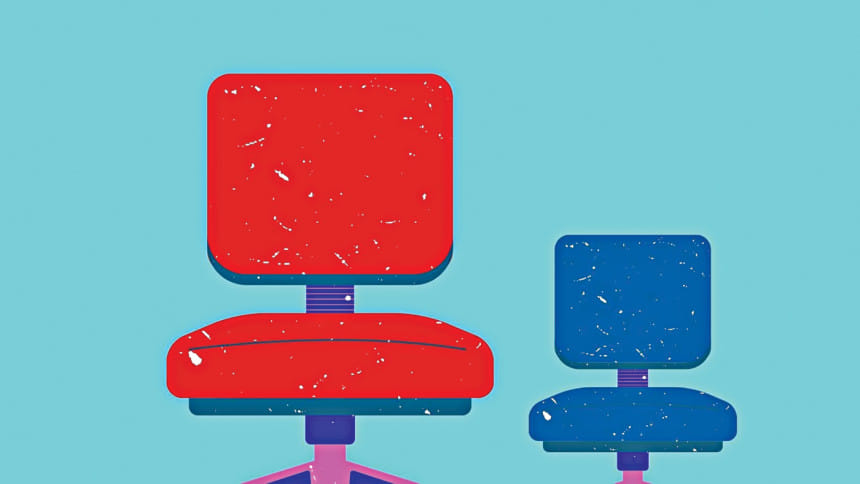Rethinking workplace gender equality

Apart from witnessing history in the last year and a half, my friends and I have also been going through personally transformative experiences. That is to say, we have graduated right in the middle of the pandemic. Some of us have chosen to take breaks, while others have managed to find our first jobs. Our experiences at the said jobs have also been equally varied.
While my internship was quite challenging, I have had a positive first job experience so far. I get to work with quite a few female colleagues and my boss is a woman too. These things make a significant impact on your mindset as well as on your ability to perform well in a given role. Unfortunately, this is not the experience for many young women. A few days back, the words my friend said stayed with me, "No one ever prepared us for this part of life."
Suraiya* was speaking about her chaotic first five months in the professional world. She had begun her current role with great enthusiasm as the company was renowned, especially for the field she studied in. However, within a few weeks, she had come to realise how much of a poor fit she was for this workplace environment. Keeping aside the absurdity of most offices in Bangladesh which insist on working on-site during the pandemic despite remote work offering high levels of efficiency, my friend had to deal with unforeseen challenges in the name of misogyny. I shudder to recall one of the instances she narrated to me in which a male colleague had said, "Hey, I am unmarried, so don't put a young woman on my team."
Lamia* now works in a better office environment but she shares the emotionally scarring internship experience at a social organization that she is yet to fully heal from, "I started working when I was really young, two months before I enrolled in university. My boss would make sexual jokes about the female body and expect me to laugh at it. Both my boss and his senior manager would body shame me relentlessly. I also ended up losing projects because I was undermined as a woman. They assumed that I wasn't capable enough to do fieldwork."
Rahat* worked for a few years as a brand executive before she left to start her own company. She recalls the seemingly well-intentioned words of counsel she had received as a new employee, "You need to give it your all to work now. Don't get distracted by marriage and other things." She also says that many people are still hesitant to employ young women to this day because of the chances of them being quickly married. This paints a larger problem with much of the professional world, the impact of which is not only restricted to women. Men are expected to spend excessive hours at the office, especially early in their careers to make a positive impression. Even though studies have shown that fewer work hours can lead to greater productivity, the norms of most industries favour employees who are seen to work in the office till late hours. As a result, most men contribute minimally to household duties, the pressure and responsibility of which invariably fall on women.
Staying late at the office also brings into account safety concerns for women who have to travel home alone. Fuelled by the drive to make more money, businesses are likely to make choices that work against the favour of women simply to capitalise on conveniences. This means that in many workplaces, men are given preferential treatment since it's often easier for them to get the job done. Instead, ideally, more time and resources would be allocated to recalibrate external conditions and reduce systemic injustices so as to build a more equitable world. Unregulated private companies will inevitably continue to make profit-driven decisions. However, it falls upon governing bodies to ensure that our economy equally values some other metrics of success as well. A simple solution to this particular scenario can be to ensure transportation for all workers, regardless of their gender.
The ratio of women to men at the aforementioned workplace was expectedly, alarmingly low. This led me to wonder about the existing challenges in the workplace that women continue to face to this day. Regardless of the beautifully curated care packages that HR departments of different corporations send to their women coworkers on the 8th of March, what are the real changes we have made to ensure gender equality?
The dangers of token gestures run deep for this very reason - what is meant to be a sign of the struggles of working-class women can too easily be converted into a photo op, as the employees themselves flood social media with pictures of being decked out in pink and purple. Sadly, that seems to be the extent to which some corporations' accountability exists. The situation begs for a keener analysis of the internalised biases we hold and social etiquettes that have been normalised. Admittedly, over the last few decades, we have seen an increasing number of women enter the workforce. Most offices have gone from being occupied fully by males to now accommodating women. This change must be reflected in deeper ways than mere statistics. Starting from the language we use to behaviour and body language, a lot demands to be reevaluated to make safe spaces for women. It is not enough to say that more women are entering the workforce, but rather we must also ask, at what cost? Ultimately, are women paying a price simply to have access to all-boys clubs?
In 1984 the Government of Bangladesh ratified The UN Convention of the Elimination of All Forms of Discrimination against Women (CEDAW). Three articles in our constitution (10, 19, 28) are dedicated to eradicating gender inequality. Article 28(4) reads, "Nothing in this article shall prevent the State from making special provision in favour of women or children or for the advancement of any backward section of citizens." This shows that the necessary laws are in place, however, a large question mark still looms over the execution of said laws.
Iceland, which is one of the highest-ranked countries in terms of gender equality, has a rich cultural history of women empowerment. After all, a large reflection of the practised behaviour of employees in the workplace is the social and cultural values we grow up with. We suffer from an unmet need for accountability measures to be in place, possibly in the form of regulatory bodies that oversee the workplace environments. Additionally, we are also tasked with embarking on the arguably more difficult journey of questioning and unlearning much of our beliefs, thought processes and language that we have inherited from the patriarchy.
*Names have been changed to protect their anonymity

 For all latest news, follow The Daily Star's Google News channel.
For all latest news, follow The Daily Star's Google News channel. 



Comments